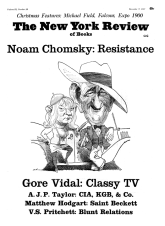In response to:
Book-Burning from the September 28, 1967 issue
To the Editors:
Readers of NYR may remember that I complained to Senator Robert Kennedy about the seizure and threatened burning by Customs of a Cuban-manufactured book that my son had bought at Expo [Sept. 28]. The Senator, despite his interest in the intellectual community, responded routinely. But Congressman Bill Ryan dutifully elicited an explanation from Lester Johnson of the Treasury Department who elicited an explanation from R. Raymond, District Director of Customs at St. Albans, Vt. I should like to share with readers the body of Mr. Raymond’s letter.
“…The inspector asked Mr. Goodman to abandon the book formally by signing Form 4609, Notice of Abandonment and Assent to Forfeiture of Prohibited Merchandise and Certificate of Destruction. Mr. Goodman refused to execute this form unless the word ASSENT was crossed out. The port director then permitted him to execute the form with the title thus altered and when this was done he noticed that a copy of the form had been made when a sheet of carbon paper, through an inadvertence, had been inserted in the pad under the first sheet. Because there is no provision for furnishing a copy of the form to a person executing it, the port director then threw the unwanted copy into the waste basket and not on the floor as stated in the letter. [Nay, he did throw it on the floor!]
“As for the statement that he might have the course Mr. Goodman’s son was taking at Cornell University, in connection with which the book was to be used, investigated, the inspector acknowledges that he may have made such a statement, but, if he did, that it was said in a joking way.
“We feel that this incident was caused, indirectly, by our customs’ officers’ insistence that Mr. Goodman execute the above-mentioned form which, to him, was tantamount to his assenting to the destruction of the book. We wish to state that, previous to this incident, we had informed our supervisory personnel that use of Form 4609 was not appropriate in cases such as this because articles of Cuban origin were not absolutely prohibited by law and that the importation to them was restricted to the extent that a license to import was required. While we have no knowledge that Foreign Assets Control has ever issued a license for articles of Cuban origin in a case such as this, we feel we have no right to presume that they would not issue one in a particular case. In other words we believe we always have to recognize the possibility that one may be issued…. With a better understanding of these instructions, they would not have insisted on Mr. Goodman’s executing the Assent to Forfeiture. [That is, “Say nothing, offer nothing to sign, and the guy will almost certainly do nothing. If he happens to complain, we are covered by saying we are waiting for him to apply for a license to Foreign Assets Control, which has never had such an application and probably wouldn’t grant it anyway.”]
“The remark the inspector is reported to have made concerning the possibility of an investigation of a course being taken by Mr. Goodman’s son at Cornell University was most unfortunate. The seriousness of it has been fully impressed on this inspector by his supervisor and we are confident that he now fully realizes that such attempts at humor should never be made by a customs employee.”
I shall now apply for a license to Foreign Assets Control and try to get my book back. It will not be burned for another nine months.
Paul Goodman
New York City
This Issue
December 7, 1967



